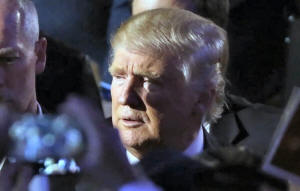|
Trump's pullout of TPP opens way for
China
 Send a link to a friend
Send a link to a friend
 [November 22, 2016]
By Ami Miyazaki and Tom Westbrook [November 22, 2016]
By Ami Miyazaki and Tom Westbrook
TOKYO/SYDNEY (Reuters) - An Asia-Pacific
trade deal stands almost no chance of working now that U.S.
President-elect Donald Trump has pulled the plug on it, proponents of
the pact said on Tuesday, opening the way for China to assume the
leadership mantle on trade.
Japan and Australia expressed their commitment to the pact on Tuesday,
hours after Trump vowed to withdraw from the 12-nation Trans-Pacific
Partnership on his first day in office, calling the deal "a potential
disaster for our country."
Trump's declaration appeared to snuff out any hopes for the deal, a
signature trade initiative of President Barack Obama, five years in the
making and meant to cover 40 percent of the world economy.
The TPP, which aims to cut trade barriers in some of Asia's
fastest-growing economies and stretch from Canada to Vietnam, can't take
effect without the United States. It requires the ratification of at
least six countries accounting for 85 percent of the combined gross
domestic product of the member nations.
Japanese Prime Minister Shinzo Abe said "the TPP would be meaningless
without the United States," even as parliament continued debating
ratification and his government vowed to lobby other members to approve
it.

Yet even without U.S. ratification, the TPP won't just die, a senior
Japanese official said.
"It just continues in a state of not being in effect," said Shinpei
Sasaki of the Cabinet Office's TPP headquarters. "In the future if the
United States takes the procedures and it passes Congress, that would
satisfy the provisions and the TPP would go into effect."
AMENDING AGREEMENT
Other members of the 12-nation grouping could conceivably work around a
U.S. withdrawal.
Australian Trade Minister Steven Ciobo told reporters in Canberra
countries could push ahead with the TPP without the United States by
amending the agreement and possibly adding new members.
"We could look at, for example, if China or Indonesia or another country
wanted to join, saying, 'Yes, we open the door for them signing up to
the agreement as well.'"
But Singapore's Prime Minister Lee Hsien Loong said reopening
negotiations wouldn't be easy. "If you sign a fresh agreement, you have
to go through it again. We haven't crossed that bridge yet. We'll cross
it if and when we come to that."
[to top of second column] |

President-elect Donald
Trump is shown at his election night rally in Manhattan, New York,
U.S., November 9, 2016. REUTERS/Jonathan Ernst

CHINA'S RIVAL PACT
China has pushed its own version of an Asia-Pacific trade pact,
called the Regional Comprehensive Economic Partnership (RCEP), which
notably excludes the United States. It is a more traditional trade
agreement, involving cutting tariffs rather than opening up
economies and setting labor and environmental standards as TPP
would.
The RCEP was a focus of attention at the Asia Pacific Economic
Cooperation summit in Peru over the weekend.
Tan Jian, a senior member of China's delegation at the summit, said
more countries are now seeking to join its 16-member bloc, including
Peru and Chile, and current members want to reach a deal as soon as
possible to counter rising protectionism.
China’s foreign ministry said on Tuesday Beijing has an “open
attitude” toward any arrangements that promote free trade in the
region as long they don’t become “fragmented and politicized”.
Foreign ministry spokesman Geng Shuang said the RCEP was an
initiative led by the 10-member Association of Southeast Asian
Nations (ASEAN), which China has been promoting. “We are willing to
keep pushing the (RCEP) talks process with all sides to achieve
positive progress at an early date,” he said.
Vietnam last week shelved its own ratification of TPP, after Obama
abandoned efforts to push it through a lame-duck Congress, while
Malaysia has shifted its attention to the RCEP.
(Reporting by Ami Miyazaki and Elaine Lies in Tokyo, Kiyoshi
Takenaka in Buenos Aires, Tom Westbrook in Sydney, Marius Zaharia in
Singapore and Elias Glenn in Beijing.; Writing by William Mallard.
Editing by Bill Tarrant.)
[© 2016 Thomson Reuters. All rights
reserved.]
Copyright 2016 Reuters. All rights reserved. This material may not be published,
broadcast, rewritten or redistributed.
 |